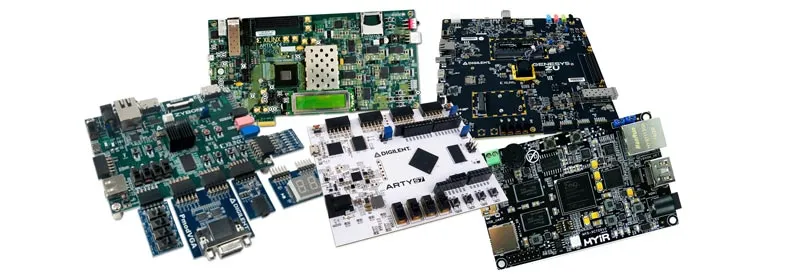Time: 2025-03-05 11:34:23View:
In 2024, FPGA (Field-Programmable Gate Array) development boards continue to be essential tools for prototyping, research, and development in fields like AI, IoT, signal processing, and hardware design. Here are the top 5 FPGA development boards in 2024, based on their features, performance, and versatility:

Key Features:
FPGA: Virtex UltraScale+ VU9P
Logic Cells: Over 1.1 million
Memory: 64 GB DDR4, 128 MB QSPI Flash
Interfaces: PCIe Gen3 x16, SFP+, HDMI, USB 3.0
Ideal for: High-performance computing, AI acceleration, and advanced signal processing.
Why It Stands Out:
Designed for high-end applications requiring massive parallel processing.
Supports advanced debugging and prototyping for complex designs.
Key Features:
FPGA: Stratix 10 GX 10M (10 million logic elements)
Memory: 16 GB DDR4, 8 GB HBM2 (High Bandwidth Memory)
Interfaces: PCIe Gen3 x16, QSFP28, USB 3.0
Ideal for: Data center acceleration, 5G infrastructure, and high-speed networking.
Why It Stands Out:
Combines high logic density with integrated High Bandwidth Memory (HBM2).
Excellent for applications requiring ultra-high-speed data transfer.
Key Features:
FPGA: Zynq UltraScale+ XCZU7EV
Logic Cells: 504K
Processor: Quad-core ARM Cortex-A53, Dual-core Cortex-R5
Memory: 4 GB DDR4, 32 MB QSPI Flash
Interfaces: HDMI, DisplayPort, SFP+, USB 3.0, PCIe Gen2 x4
Ideal for: Embedded vision, AI inference, and multimedia processing.
Why It Stands Out:
Combines FPGA fabric with a powerful ARM processor for hybrid designs.
Great for applications requiring both hardware acceleration and software control.
Key Features:
FPGA: Lattice ECP5
Logic Cells: 85K
Memory: 256 MB DDR3, 32 MB Flash
Interfaces: HDMI, USB 2.0, PCIe, GPIO
Ideal for: Low-power applications, IoT, and edge computing.
Why It Stands Out:
Compact and cost-effective, ideal for small-scale projects.
Low power consumption makes it perfect for portable and battery-powered devices.
Key Features:
Logic Cells: 101K
Memory: 256 MB DDR3, 16 MB QSPI Flash
Interfaces: USB-UART, Ethernet, PMOD, Arduino-compatible headers
Ideal for: Education, hobbyists, and small-scale prototyping.
Why It Stands Out:
Affordable and beginner-friendly, with a large community and extensive documentation.
Versatile connectivity options for various peripherals.
| Board Name | FPGA Model | Logic Cells | Key Interfaces | Best For |
|---|---|---|---|---|
| Xilinx Virtex UltraScale+ VCU118 | Virtex UltraScale+ VU9P | 1.1M+ | PCIe Gen3, SFP+, HDMI | High-performance computing, AI |
| Intel Stratix 10 GX Dev Kit | Stratix 10 GX 10M | 10M | PCIe Gen3, QSFP28, HBM2 | Data centers, 5G, networking |
| Xilinx Zynq UltraScale+ ZCU106 | Zynq UltraScale+ XCZU7EV | 504K | HDMI, DisplayPort, USB 3.0 | Embedded vision, AI, multimedia |
| Lattice ECP5 Versa Board | Lattice ECP5 | 85K | HDMI, USB 2.0, PCIe | IoT, edge computing, low-power designs |
| Xilinx Artix-7 Arty A7 | Artix-7 XC7A100T | 101K | USB-UART, Ethernet, PMOD | Education, hobbyists, small-scale projects |
High-End Performance: Xilinx Virtex UltraScale+ VCU118 and Intel Stratix 10 GX are ideal for demanding applications like AI, data centers, and 5G.
Hybrid Processing: Xilinx Zynq UltraScale+ ZCU106 is perfect for applications requiring both FPGA and ARM processing.
Low-Power & Compact: Lattice ECP5 Versa Board is great for IoT and edge computing.
Beginner-Friendly: Xilinx Artix-7 Arty A7 is the best choice for students and hobbyists.
The choice of FPGA development board depends on your project requirements, budget, and expertise level.